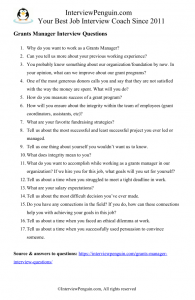Even when one has the best intentions, and runs a non-profit activity or organization, it’s hard to make a difference in someone’s life, without spending money. Because everything has some price. Luckily we have foundations and other organizations, supported by wealthy donors, who provide grants to smaller non-profit organizations and initiatives.
Distributing the funds they collect from donors, they try to support meaningful initiatives that resonate with the values and goals of the foundation, the reason why it exists. Working as a grants manager, you will play a crucial role in this process.
You will design grant programs, research funding opportunities, coordinate with the grant writers, track applications, and basically do your best to ensure that the money ends up in the right hands at the end. Let’s have a look at some questions you may get while interviewing for this interesting position.
Table of Contents
Why do you want to work as a Grants Manager?
It sounds almost like a silly question, considering how amazing this position is, and what kind of impact you can have while working as a grants manager. Still, it’s not enough saying that you see a meaningful purpose in the job and want to make an impact in this or that community, city, or country.
Refer to your skills and experience, explaining how everything you’ve done up to this point in life has prepared you for this responsible role. Experience in finance, accounting, management, and of course excellent communication skills. Values also matter in this role. Integrity should top your list of values and principles.
Last but not least, you can also explain why you chose their organization. Tell them how what they do resonates with your values, and briefly praise them for the positive difference they are making in the world as a foundation.
Can you tell us more about your previous working experience?
In many interviews this is an icebreaker question. Not in this one though. Experience plays a pivotal role in the hiring process of a new Grants Manager. Unless you manage to demonstrate your readiness for the job while narrating what you did in the past, it will be hard to succeed and secure the coveted job contract.
You can either talk in a chronological order, explaining how your past roles have prepared you for this one, or you can point out specific roles and projects. Be sure to talk about planning, budgeting, auditing, managing small team, and of course about adherence to federal and other regulations.
In an ideal case you should have some experience with grant management. If you do not have it, however, your best bet is to explain how you actually did the same things you’d do in the new job, while working on something else, even in a commercial sphere.
You probably know something about our organization/foundation by now. In your opinion, what can we improve about our grant programs?
The interview won’t get any easier. First of all, you need to do an excellent research about the organization and their existing grant programs–many questions can rely to them.
Secondly, they do not hire you to keep the status quo. They want you to improve something, to make things better. Hence you should always find some areas for improvement. Maybe a better targeting of the grants, or you feel that they neglected the promoting part, and likely didn’t get as many good grant applications as they could, and eventually didn’t allocate the money the way they wanted.
Or the communication with donors wasn’t great, or they should involve more support agencies in the process, etc. Do your research and find areas for improvement. But do not point out some minor details–talk rather about bigger changes and overall direction. That’s what they want from you as a manager…
One of the most generous donors calls you and say that they are not satisfied with the way the money are spent. What will you do?
Without donors there won’t be any foundation. Hence it is pivotal to do everything to keep them happy. And at the end of the day, everything is about communication.
Do not say that you will simply send them a newsletter or ask one of your assistants to talk to them, and explain how the money were spent. On the contrary, you will visit them in person, bringing materials and pictures with you, and perhaps also financial statements, clearly demonstrating where the money they donated ended.
And of course you do not run only one grant program. If the donor still isn’t satisfied, you will introduce them to other opportunities, something that perhaps matches their expectations better. You will simply try your best not to lose them.
How do you measure success of a grant program?
You have several options for a good answer at this point. First one is referring to goals you set for each grant program. You do not rely on luck in your work. While designing a grant program, you set clear goals for it–can be the eventual number of grants awarded funding, but it can be also an impact you want to make (in whatever form).
These goals help you to plan things properly, and are also a yardstick to measure whether the grant program was successful or not.
You can also point out a list of indicators you monitor with each grant program, such as:
- the number of grants the organization has written
- the number of funders and donors
- number of applicants who eventually got the funding
- total amount spent (or percentage of allocated funds spent, should be 100% in an ideal case)
- …
How will you ensure about the integrity within the team of employees (grant coordinators, assistants, etc)?
When big money is involved, there’s always a temptation. Someone’s brother may apply, or a cousin, or a friend of a friend of a friend (if you know what I mean). And suddenly their application gets a different treatment, or they are awarded more money than the other applicants.
It’s not easy to prevent this from happening, especially if you work in a big foundation where dozens of people are involved in the grant management. But you should at least try.
Say that you plan to set proper control mechanisms in place. Audits will be throughout and common, and compliance to the rules and impartiality will be the core values in the team under your leadership.
Of course you cannot monitor everything, but you will at least try your best. That’s the attitude they seek in a best candidate for the job.
Other questions you may face in your Grants Manager job interview
- What are your favorite fundraising strategies?
- Tell us about the most successful and least successful project you ever led or managed.
- Tell us one thing about yourself you wouldn’t want us to know.
- What does integrity mean to you?
- What do you want to accomplish while working as a grants manager in our organization? If we hire you for this job, what goals will you set for yourself?
- Tell us about a time when you struggled to meet a tight deadline in work.
- What are your salary expectations?
- Tell us about the most difficult decision you’ve ever made.
- Do you have any connections in the field? If you do, how can these connections help you with achieving your goals in this job?
- Tell us about a time when you faced an ethical dilemma at work.
- Tell us about a time when you successfully used persuasion to convince someone.
* Special Tip: If you are not sure how to answer the questions from my list, or experience interview anxiety, have a look at our Interview Success Package. Up to 10 premium answers to basically all tricky questions you may face in your Grants Manager job interview will help you streamline your interview preparation, outclass your competitors, and eventually get the job. Thank you for checking it out!
Final thoughts
Interview for a job of a Grants Manager belongs to tricky interviews. We talk about a very specific position here, with big responsibility. It is not easy to predict the exact questions you will face, and it depends a lot on the people who will lead the interview with you (can be a variety of bodies with all kinds of experiences and expectations).
Take my list as a general guideline only… The best thing you can do to prepare for your interview is learning as much as you can about their organization, and preparing for a big variety of questions. Check their existing grant programs, list of donors, values of the foundation, things they try to achieve with their activities.
In order to prepare for a variety of behavioral and situational questions (explaining how you reacted or would react in this or that situation in work) that you will almost always face in this interview, check out our Interview Success Package. Thank you, and good luck!
Matthew
* Alternatively you can download the list of questions in a one page long PDF, and practice your interview answers anytime later:

May also interest you:
- Fundraising manager interview questions.
- Program manager interview questions.
- Salary negotiation tips – I am sure that salary isn’t the deciding factor in this case, that you think about something else when applying for a Grants Manager job. If you want to negotiate at least a slightly better offer, however, check our guide.

